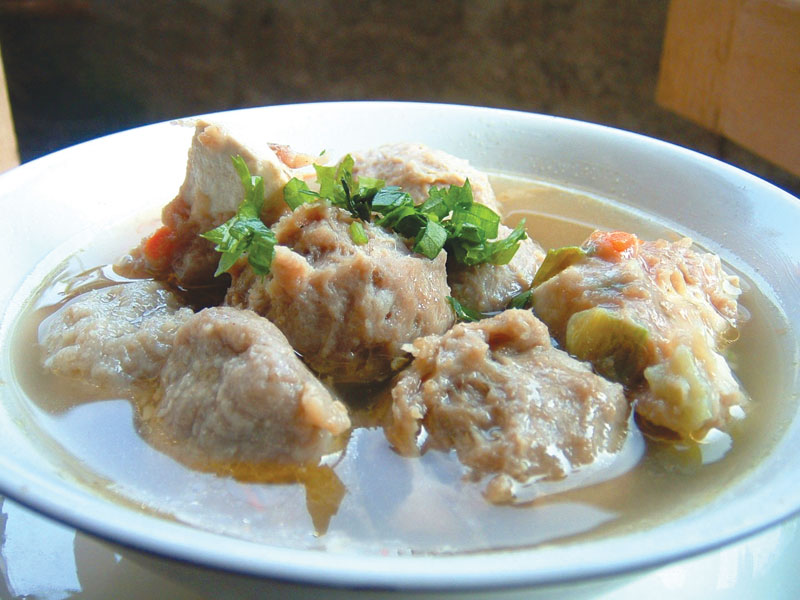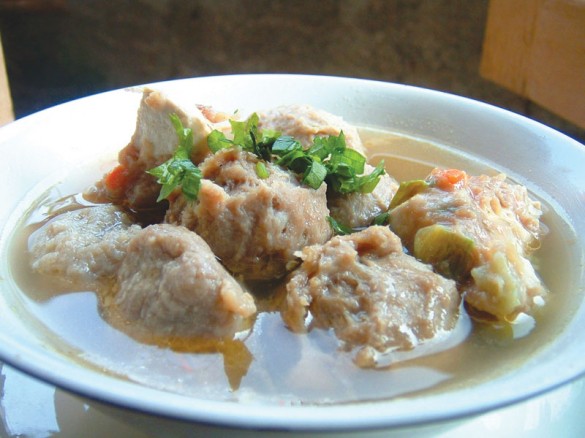What’s a Jewish dilemma? Pork at half price. That was one of the first jokes I heard during a visit to Israel about 20 years ago. Some producers of beef products in Jakarta have experienced a similar dilemma. A kilogram of beef in the city sells for around Rp.100,000, whereas a kilo of pork costs closer to Rp.50,000.
Devout Muslims are supposed to refrain from eating pork because pigs are deemed haram (forbidden). But thanks in part to corrupt behaviour by the Islam-based Prosperous Justice Party (PKS), some producers of bakso (meatball soup) have added pork to their products and sold it as genuine beef.
Beef started to become unaffordable for many Indonesians three years ago, when the government slashed import quotas in a move that it claimed would support domestic production. Consequently, companies wishing to import beef had to pay bribes to corrupt officials from the PKS, as it had strong influence with the Agriculture Ministry.
The artificially high price was passed on to consumers. Hence some bakso makers cut costs by blending pork and chicken into their meatball mixes. Bakso itself is not exactly high cuisine to begin with, as it is rarely made from prime cuts of beef. Like the cheapest sausages, these chewy grey balls are likely to contain ground up hearts, tongues, eyelids, ears, snouts, spleens, testicles and other bits of offal.
Two years after my visit to Israel, I was working as a junior chef in a restaurant in the French Alps, where I observed the truth of the maxim that “what the customer doesn’t see, the chef gets away with”. This meant that a steak could be dropped on the floor or sneezed on or worse, yet still get served to a diner. Similarly, consumers in Jakarta may be none the wiser after consuming bakso made from rat and/or pork. Likewise, fish and shrimps raised in sewage ponds may taste fine from the plate.
Most of the bakso sold in Jakarta comes from street vendors, the majority of whom do not go to the expense of obtaining halal certification from the Indonesian Ulemas Association (MUI), the country’s top Islamic authority. Such a certificate costs about Rp.2.5 million and requires renewal. Anti-corruption watchdog Transparency International Indonesia has in the past accused MUI of taking bribes to issue about 10% of halal certificates.
MUI wants to further protect Indonesians by setting up a halal certification system for all medicine. In 2009, MUI declared the use of GlaxoSmithKline’s meningitis vaccine haram because it had been developed from a porcine enzyme. The following year, the Health Ministry halted the distribution of the vaccine. Fortunately the government has so far rejected the proposed halal certification for medicine.
Authorities rarely test street food for forbidden substances. In addition to scares over rat meat and pork, there are occasional reports of bakso and tofu testing positive for illegal preservatives, such as borax and formaldehyde, neither of which do much good for the body. Beef in some markets has been found to contain heartworm. High beef prices and bad press have caused many bakso vendors to go out of business.
The government has played down concerns that some of the beef being imported into Indonesia might come from cattle injected with a potentially carcinogenic growth hormone. The Trade Ministry insists there is nothing to worry about because the beef imports have been examined by the Agriculture Ministry and declared halal by the MUI.
During the annual Muslim fasting month of Ramadhan, the Health Ministry’s Food and Drug Control Agency (POM) conducts inspections to ensure that vendors are not selling expired foods. They never seem to reach a couple of my local supermarkets, where fruit and vegetables of advanced age and weevil-infested rice are kept on the shelves. POM in September issued a statement warning that “irresponsible persons” were misusing the agency’s name to request “donations” from businesses.
Most supermarkets print the date of packaging on their plastic-wrapped fruit and vegetables, though after a few days, some simply replace these with newly dated stickers to make old produce appear fresh.
Food scams in Jakarta pale in comparison to problems caused by legitimate grocery businesses. The rise of minimarts offering sugary processed foods has been accompanied by a surge in diabetes and plastic litter from food packaging. If you care about your health, buy some fruit. Whereas if you order bakso, what you don’t know won’t hurt you – if you’re lucky.





